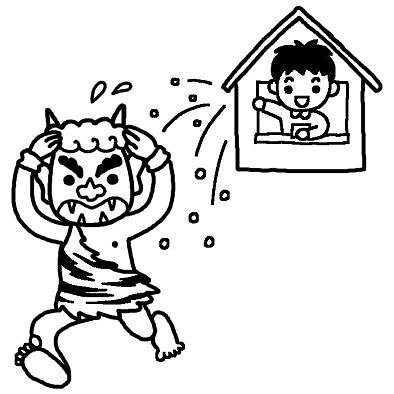.jpg) |
.jpg) |
| T-chan came to our home on last May for the first time, first of this year we went to Oyama Shinto shirine with her on February 3rd. |
|
|
|
|
| ‹ژ”Nپi‚Q‚O‚P‚V”Nپj‚ج‚TŒژ‚ةڈ‰‚ك‚ؤ‚¤‚؟‚ة—ˆ‚½‚s‚؟‚ل‚ٌ‚إ‚·‚ھپAچ،”N‚ح‚ـ‚¸پA ”قڈ—‚ئ‚QŒژ‚R“ْ‚ة”ِژRگ_ژذ‚ةچs‚ء‚ؤ‚«‚ـ‚µ‚½پB |
|
| February 3rd is the day of Setsubun, Bean-Throwing Festival in Japan. | |
| “ْ–{‚إ‚حپA‚QŒژ‚R“ْ‚حگك•ھ‚ج“ْپ[“¤‚ـ‚«‚ج“ْ‚إ‚·پB | |
 |
 |
| Setsubun means the ending of winter and the beginning of spring. | |
| گك•ھ‚ح“~‚ھڈI‚ي‚ء‚ؤپAڈt‚ة‚ب‚邱‚ئ‚ًˆس–،‚µ‚ؤ‚¢‚ـ‚·پB | |
| People throw beans inside and outside of our house to drive away evil and bring in good luck. |
|
| گlپX‚حژ׋C‚ًâP‚¢پA•ں‚ًڈµ‚‚½‚ك‚ةپA“¤‚ً‰ئ‚ج’†‚ئٹO‚ة“ٹ‚°‚ـ‚·پB | |
 |
 |
| And then people shout the words "Oniwaپ`soto", Fukuwaپ`uchi, meaning "Devils out ! پ@Happiness in". |
|
| ‚»‚µ‚ؤ‚»‚جژ‚ةپAگlپX‚حپu‹S‚حٹOپA•ں‚ح“àپIپv‚ئ‹©‚ر‚ـ‚·پB | |
.jpg) There was still snow on the ground. ’n–ت‚ة‚ح‚ـ‚¾گل‚ھ‚ ‚è‚ـ‚µ‚½پB |
.jpg) Oyama Shinto shirine is located city center in Kanazawa. ”ِژRگ_ژذ‚ح‹à‘ٍ‚ج’†گS•”‚ةˆت’u‚µ‚ؤ‚¢‚ـ‚·پB |
.jpg) About a decade ago, I made these masks of red and blue demons by myself.. ‚P‚O”N‚‚ç‚¢‘O‚ةپAژ„‚ح‚±‚ê‚ç‚ج گش‹S‚ئگآ‹S‚ج‚¨–ت‚ًژ©•ھ‚إچى‚è‚ـ‚µ‚½پB |
.jpg) She is wearing the face mask of blue demond. ”قڈ—‚حگآ‹S‚ج‚¨–ت‚ً‚©‚ش‚ء‚ؤ‚¢‚ـ‚·پB |
.jpg) Stuffed pig is wearing the face mask of red pig demon. “ط‚ج‚ت‚¢‚®‚é‚ف‚حگش“ط‹S‚ج‚¨–ت‚ً‚©‚ش‚ء‚ؤ‚¢‚ـ‚·پB |
.jpg) |
|
|
|
.jpg) He is a Shinto priest. ”ق‚حگ_ژه‚³‚ٌ‚إ‚·پB He is explaning about throwing beans. “¤‚ـ‚«‚ة‚آ‚¢‚ؤگà–¾‚µ‚ؤ‚¢‚ـ‚·پB |
.jpg) |
|
|
|
.jpg) Throwing beans started ! “¤‚ـ‚«‚ھژn‚ـ‚è‚ـ‚µ‚½پI "Oniwaپ`soto", Fukuwaپ`uchi ! پu‹S‚حپ`ٹOپA•ں‚حپ`“àپvپI |
.jpg) Red demon has a metal bar called "Kanabo". گش‹S‚حپu‹à–_پv‚ًژ‚ء‚ؤ‚¢‚ـ‚·پB |
.jpg) People (including me) were so crazy about picking up the beans. گlپXپiژ„‚àٹـ‚ك‚ؤپj‚ح“¤‚ً‚ذ‚낤‚ج‚ة–²’†‚إ‚µ‚½پB That was more scary than demons. ‹S‚½‚؟‚و‚è‚à‚»‚ء‚؟‚ج•û‚ھ‚±‚ي‚©‚ء‚½‚إ‚·پiڈخپjپB |
.jpg) Let's take a photo with red demon ! گش‹S‚³‚ٌ‚ئژتگ^‚ًژB‚낤پ@پI |
| Then she came our home in 3 months this May again. |
|
| ‚»‚ê‚©‚ç‚R‚©ŒژŒم‚جچ،”N‚ج‚TŒژ‚ةپA”قڈ—‚ح‚ـ‚½‚¤‚؟‚ة—ˆ‚ـ‚µ‚½پB | |
پœژwژ¦ژŒ(this/that/these/those) ‚â last/next ‚ب‚ا‚جŒêپAژ‚ً•\‚·–¼ژŒ پ@پ@ (morning, afternoon, night, ..., April, May, ..., پ@پ@پ@پ@ پ@پ@ پ@پ@day, hour, week, month, year, time, ...)‚ح•›ژŒ“I‚ة‹@”\‚µپA‚»‚ج‘O‚ة‘O’uژŒ‚ً‚ئ‚ç‚ب‚¢پB پ@پ@پ@پ~ in this morningپ@پ¨پ@پ› this morning پ@پ@پ@پ~ in this afternoonپ@پ¨پ@پ› this afternoon پ@پ@پ@پ~ in last Septemberپ@پ¨ پ› last September پ@پ@پ@پ~ in next weekپ@پ¨پ@پ› next week پ@پ@پ@پ~ in last yearپ@پ¨پ@پ› last year پ@پ@پ@We will have a baby in this May.پuچ،”N‚ج5Œژ‚ةگش‚؟‚ل‚ٌ‚ھگ¶‚ـ‚ê‚ـ‚·پv پ@پ@پ@ژہ‚ح in this may ‚ئ‚¢‚¤ڈ‘‚«•û‚ح•¶–@“I‚ةŒë‚èپB‚±‚جƒ~ƒX‚ً‚·‚é“ْ–{گl‚ھ”ٌڈي‚ة‘½‚¢پB پ@پ@پ@پuپ`‚ج’†‚ةپv‚ً•\‚·‘O’uژŒ in ‚ًژg‚ء‚ؤ‚µ‚ـ‚¤پB‚±‚جڈêچ‡پAin ‚ئ‚¢‚¤‘O’uژŒ‚ً”²‚¢‚½•\Œ»‚ھگ³‚µ‚¢پB پ@پ@پ@پ@پ@پ@پ~ We will have a baby in this May. پ@پ@پ@پ@پ@پ@پ› We will have a baby this May. پ@پ@پ@پ@پ@پ@پu‚TŒژ‚ةپv‚ئ‚¢‚¤•\Œ»‚ب‚çپAin May‚إچ\‚ي‚ب‚¢پB پ@پ@پ@پ@پ@پ@‚µ‚©‚µ‚±‚±‚إ‚ج–â‘è‚حپAژwژ¦ژŒ‚إ‚ ‚é this ‚ج‘¶چفپB پ@پ@پ@پ@پ@پ@this ‚ئ‚¢‚¤ژwژ¦ژŒ‚ھ‚آ‚‚±‚ئ‚ة‚و‚èپA‘O’uژŒ‚ً’u‚‚±‚ئ‚ً–W‚°‚éپB پ@پ@پ@‚±‚ê‚ح‰½‚à this ‚ةŒہ‚ء‚½‚±‚ئ‚إ‚ح‚ب‚پAthat‚â•،گ”Œ`‚جtheseپAthose‚ھ پ@پ@پ@‚ـ‚½پAlastپu‘O‚جپvپAnextپuژں‚جپv‚ئ‚¢‚¤Œê‚ج‘O‚ة‚à‘O’uژŒ‚ً‚¨‚‚±‚ئ‚ھ‚إ‚«‚ب‚¢پB پ@پ@پ@‚±‚ê‚حپA–{—ˆ–¼ژŒ‚إ‚ ‚é May ‚ب‚ا‚ج•\Œ»‚ھ this ‚â that ‚ج‚و‚¤‚بŒê پ@پ@پ@پ@پ@پ@I ate the cake in the morning.پ@پ@پ@پ@پu’©پAƒPپ[ƒL‚ًگH‚ׂ½پv پ@پ@پ@پ@پ~ I ate the cake in this morning. پ@پ@پ@پ@پƒthis پ{ ژ‚ً•\‚·–¼ژŒپ„ ‚ئ‚¢‚¤‘g‚فچ‡‚ي‚¹‚ھ•›ژŒ“I‚ة“‚‚ج‚إپA |
|
| Actually she was going to come to our home in April, but she couldn't come because she was busy for study. |
|
| –{“–‚ح”قڈ—‚ح‚SŒژ‚ة—ˆ‚é—\’è‚إ‚µ‚½‚ھپA•×‹‚ھ–Z‚µ‚‚ؤ‚ب‚©‚ب‚©—ˆ‚邱‚ئ‚ھ‚إ‚«‚ـ‚¹‚ٌ‚إ‚µ‚½پB | |
| She was studying TOEIC and other study for graduate school entrance examination. |
|
| ‘هٹw‰@‚جژژŒ±‚ج‚½‚ك‚ةپA‰pŒê‚جƒgپ[ƒCƒbƒN‚â‚»‚ج‘¼‚ج•×‹‚ً‚µ‚ؤ‚¢‚½‚ٌ‚إ‚·پB | |
TOEIC = Test of English for International Communication چ‘چغƒRƒ~ƒ…ƒjƒPپ[ƒVƒ‡ƒ“‚ج‚½‚ك‚ج‰pŒê—ح‘ھ’èژژŒ± |
|
| I always admire her studiousness. | |
| ژ„‚ح‚¢‚آ‚à”قڈ—‚ج•×ٹwگSپi‹خ•×‚³پj‚ةٹ´گS‚µ‚ـ‚·پB | |
| studiousness پiƒXƒgƒDپ[ƒfƒBƒIƒXƒlƒXپj‹خ•×پA•×ٹwگS studiousپ@پiƒXƒgƒDپ[ƒfƒBƒIƒXپjپ@•×‹چD‚«‚بپA‚و‚•×‹‚·‚éپA”MگS‚ب |
|
| I picked her up at 5 p.m. at her apartment. | |
| ژ„‚ح—[•û‚Tژ‚ةپA”قڈ—‚جƒAƒpپ[ƒg‚ةŒ}‚¦‚ةچs‚«‚ـ‚µ‚½پB | |
| The dinner was "Ozashiki-Tempura"for T-chan who loves shrimp. | |
| ٹCکV‚ھ‘هچD‚«‚ب‚s‚؟‚ل‚ٌ‚ج‚½‚ك‚ةپA‚»‚ج“ْ‚ج—[گH‚حپu‚¨چہ•~“V‚ص‚çپv‚ة‚µ‚ـ‚µ‚½پB | |
.jpg) |
.jpg) These are small shrimp called "Amaebi". ‚±‚ê‚ç‚حٹأٹCکV‚ئŒؤ‚خ‚ê‚ؤ‚¢‚éڈ¬‚³‚بٹCکV‚إ‚·پB |
| She had never eaten "Ozashiki-Tempura". | |
| ”قڈ—‚ح‚¨چہ•~“V‚ص‚ç‚ًگH‚ׂ½‚±‚ئ‚ھ‚ ‚è‚ـ‚¹‚ٌ‚إ‚µ‚½پB | |
| She asked me, "What's the meaning of Ozashiki ? " | |
| ”قڈ—‚حژ„‚ة‚«‚«‚ـ‚µ‚½پAپu‚¨چہ•~‚ء‚ؤپA‚ا‚¤‚¢‚¤ˆس–،‚إ‚·‚©پHپv | |
| I answered her, "We say japanese-style guest room, پ@پ@Ozashiki, in Japan. It's your sleeping room tonight. We usually cook the Tempura at kitchen. But in Ozashiki-Tempura, we eat Tempura in Ozashiki پ@پ@while deep frying tempura in Ozashiki. In the case of our home, it's a Livingroom-Tempra though." |
|
| ژ„‚ح“ڑ‚¦‚ـ‚µ‚½پAپuکaژ؛‚ج‹qٹش‚ج‚±‚ئ‚ً“ْ–{‚إ‚ح‚¨چہ•~‚ئ‚¢‚¢‚ـ‚·پB چ،”سپA‚ ‚ب‚½‚ھ–°‚é•”‰®‚إ‚·پB •پ’ت‚حپAژ„’B‚ح‘نڈٹ‚إ“V‚ص‚ç‚ً—؟—‚µ‚ـ‚·پB ‚إ‚à‚¨چہ•~“V‚ص‚ç‚إ‚حپA‚¨چہ•~‚إ“V‚ص‚ç‚ً—g‚°‚ب‚ھ‚çپA‚¨چہ•~‚إ“V‚ص‚ç‚ًگH‚ׂé‚ج‚إ‚·پB ‰ن‚ھ‰ئ‚جڈêچ‡‚حپAƒٹƒrƒ“ƒO“V‚ص‚ç‚إ‚·‚¯‚ا‚àپBپv |
|
in the case of پ`پ@پ@پ@پ`‚جڈêچ‡‚ح |
|
| Ozashiki-Tempra is dangerous a little, so I spat those ingredients on the long bamboo sticks. |
|
| ‚¨چہ•~“V‚ص‚ç‚ح‚؟‚ه‚ء‚ئٹë‚ب‚¢‚ج‚إپAژ„‚ح’·‚¢’|‹ّ‚ةپAچق—؟‚ًژh‚µ‚ـ‚µ‚½پB | |
| پ@پ@spit پ@پiƒXƒsƒbƒgƒDپjپ@‹ّ‚ةژh‚· ‰ك‹ژŒ`‚حapatپiƒXƒpƒbƒgƒDپj |
|
.jpg) The ingredients were Amaebi shrimps, lotus root, eggplants, small green peppers and dried shiitake mushrooms. چق—؟‚حٹأٹCکVپA‚ê‚ٌ‚±‚ٌپA‚ب‚·پA‚µ‚µ“‚پA ‚»‚µ‚ؤٹ±’إ‘ù‚إ‚µ‚½پB |
.jpg) |
|
|
|
| We ate just deep fried tempura. | |
| ژ„’B‚ح—g‚°‚½‚ؤ‚ج“V‚ص‚ç‚ًگH‚ׂـ‚µ‚½پB | |
| Well, how many sticks did we eat ? | |
| ‚³‚ؤپAژ„’B‚ح‰½‹ّگH‚ׂ½‚إ‚µ‚ه‚¤‚©پH | |
| I ate 9 sticks, my husband ate 11 sticks and T-chan ate 16 sticks, although she was on a diet. |
|
| ژ„‚ھ‚X‹ّپA•v‚ھ‚P‚P‹ّپA‚»‚µ‚ؤ‚s‚؟‚ل‚ٌ‚حƒ_ƒCƒGƒbƒg’†‚إ‚ ‚é‚ة‚à‚©‚©‚ي‚炸پA‚P‚U‹ّ‚àگH‚ׂـ‚µ‚½پI | |
| Although پ@پ{پ@ژهŒêپ{“®ژŒپ@پ@پ@پ@پ`‚¾‚¯‚ا‚àپAپ`‚إ‚ ‚é‚ة‚à‚©‚©‚ي‚炸 پ`پ@‚ج•”•ھ‚ھ–¼ژŒ‚ب‚ç‚خپ@پ@in spite of پ@‚إ‚و‚¢ Although it is snowing, I have to go to work. گل‚ھچ~‚ء‚ؤ‚¢‚é‚ة‚à‚©‚©‚ي‚炸پAژdژ–‚ةچs‚©‚ب‚¯‚ê‚خ‚ب‚ç‚ب‚¢پB Although I have studied English for 5 years, I am not good at speakinf it. ‚T”Nٹش‰pŒê‚ً•×‹‚µ‚ؤ‚¢‚é‚ج‚ة‚à‚©‚©‚ي‚炸پA‰pŒê‚ًکb‚·‚ج‚ھ“¾ˆس‚إ‚ح‚ ‚è‚ـ‚¹‚ٌپB |
|
.jpg) |
.jpg) Fortunetelling is a hit or miss business. “–‚½‚é‚à”ھŒT“–‚½‚ç‚ت‚à”ھŒTپ` |
| I thought only Japanese young women are on a diet, although they are not fat, but Chinese young women do the same, don't they ? |
|
| “ْ–{گl‚جژل‚¢ڈ—گ«‚¾‚¯‚ھ‘¾‚ء‚ؤ‚¢‚ب‚¢‚ج‚ةپAƒ_ƒCƒGƒbƒg‚·‚é‚ٌ‚¾‚ئژv‚ء‚ؤ‚¢‚½‚çپA ’†چ‘گl‚à“¯‚¶‚ب‚ٌ‚إ‚·‚ثپ`پB |
|
| After the dinner, we enjoyed a chat, then she took a hot bath leisurely (She loves Japanese style bath) |
|
| گHŒم‚ج‚¨‚µ‚ل‚ׂè‚ًٹy‚µ‚ٌ‚إ‚©‚çپA”قڈ—‚ح‚¨•—کCپi”قڈ—‚ح“ْ–{ژ®‚ج‚¨•—کC‚ھ‘هچD‚«‚إ‚·پj‚ة ‚ن‚ء‚‚è“ü‚è‚ـ‚µ‚½پB |
|
| The next day, it was sunny day, we desided to see paragliders in Shishikukogen Highlands. |
|
| —‚“ْ‚ح‚¢‚¢‚¨“V‹C‚¾‚ء‚½‚ج‚إپAژ„’B‚حژ‚ژq™لچ‚Œ´‚ضƒpƒ‰ƒOƒ‰ƒCƒ_پ[‚ً Œ©‚ةچs‚‚±‚ئ‚ةŒˆ‚ك‚ـ‚µ‚½پB |
|
| Before we went there, I wanted her to watch a video. | |
| ژ‚ژq™ل‚ةچs‚‘O‚ةپA”قڈ—‚ةŒ©‚¹‚½‚¢ƒrƒfƒI‚ھ‚ ‚è‚ـ‚µ‚½پB | |
| It was "Red Bull X-Alps" پ@پ@that the paraglider race is held in the European Alps پ@پ@once every 2 years, it was broadcasted on TV a few years ago. Information about X-Alps is from here پ¨Wikipedia ‚w-Alps My home page about X-Alps is from here پ@پ@پ¨http://ryouri.sakura.ne.jp/englishdiary/redbullxalps.html |
|
| ‚»‚ê‚ح‰½”N‚©‘O‚ةƒeƒŒƒr‚إ•ْ‰f‚³‚ꂽپhXپ\ƒAƒ‹ƒvƒXپh‚ئ‚¢‚¤ƒˆپ[ƒچƒbƒpƒAƒ‹ƒvƒX‚إ پ@پ@‚Q”N‚ة‚P‰ٌٹJچأ‚³‚ê‚éƒpƒ‰ƒOƒ‰ƒCƒ_پ[‹£‹Z‚إ‚µ‚½پB ‚wƒAƒ‹ƒvƒX‚ةٹض‚·‚éڈî•ٌ‚ح‚±‚؟‚ç‚©‚çپ¨Wikipedia ‚w-Alps ژ„‚ج‚wƒAƒ‹ƒvƒX‚ة‚آ‚¢‚ؤ‚جƒzپ[ƒ€ƒyپ[ƒW‚ح‚±‚؟‚ç‚©‚ç پ¨پ@http://ryouri.sakura.ne.jp/englishdiary/redbullxalps.html |
|
 |
 |
| After watching the video, we talked with a laugh , "There's a world of defference between Shisiku and X-Alps." |
|
| ژ„’B‚ح‚»‚جƒrƒfƒI‚ًŒ©‚½‚ ‚ئپAژ‚ژq™ل‚جژR‚جڈم‚©‚ç‰؛‚ـ‚إƒpƒ‰ƒOƒ‰ƒCƒ_پ[‚إ”ٍ‚ش‚ج‚ئپA ƒIپ[ƒXƒgƒٹƒA‚©‚烂ƒiƒR‚ـ‚إƒpƒ‰ƒOƒ‰ƒCƒ_پ[‚إ”ٍ‚ش‚ج‚ح‰_“D‚جچ·‚¾‚ثپcپc پ@پ@پ@‚ئڈخ‚¢‚ب‚ھ‚çکb‚µ‚ـ‚µ‚½پB |
|
|
‰_“D‚جچ·پ@پ@پ@a world of difference (big gap) |
|
| On the way, I talked on the mobile phone with our friend پ@پ@who has his own paraglider. He said, "You have to pay attention about the direction of the wind, because they need headwind for taking off " |
|
| ژ‚ژq™ل‚ضچs‚“r’†پAژ„‚حژ©•ھ‚جƒpƒ‰ƒOƒ‰ƒCƒ_پ[‚ًژ‚ء‚ؤ‚¢‚é—F’B‚ئ پ@پ@پ@ƒpƒ‰ƒOƒ‰ƒCƒ_پ[‚ة‚آ‚¢‚ؤŒg‘ر“dکb‚إکb‚µ‚ـ‚µ‚½پB ”ق‚ة‚و‚é‚ئپAپu—£—¤‚ة‚حپAŒü‚©‚¢•—پi‹t•—پj‚ھ•K—v‚ب‚ج‚إپA•—Œü‚«‚ة’چˆس‚µ‚ؤ‰؛‚³‚¢‚ثپBپv‚ئ‚ج‚±‚ئ‚إ‚µ‚½پB |
|
the direction of the windپ@پ@•—Œü‚« headwindپ@Œü‚©‚¢•—پi‹t•—پj |
|
| Then T-chan told me, "Okasan(Mother) has many different kinds of friends." | |
| ‚s‚؟‚ل‚ٌ‚حژ„‚ةپu‚¨•ê‚³‚ٌ‚ح‚¢‚ë‚¢‚ëˆل‚¤ژي—ق‚ج—F’B‚ھ‚½‚‚³‚ٌ‚¢‚é‚ٌ‚إ‚·‚ثپBپv‚ئŒ¾‚¢‚ـ‚µ‚½پB | |
| We arrived Shisiku, first we went to paragliding landing field. | |
| ژ‚ژq™ل‚ة“’…‚µ‚ؤپA‚ـ‚¸ژ„’B‚حƒpƒ‰ƒOƒ‰ƒCƒ_پ[‚ج’…—¤ڈê‚ةچs‚«‚ـ‚µ‚½پB |
|
.jpg) |
.jpg) |
| Many various colored paragliders glided down from the mountain. | |
| ژR‚جڈم‚©‚çگF‚ئ‚è‚ا‚è‚جƒpƒ‰ƒOƒ‰ƒCƒ_پ[‚ھ‚س‚ي‚س‚ي‚ئ”ٍ‚ٌ‚إ‚«‚ـ‚µ‚½پB | |
.jpg) |
.jpg) |
.jpg) |
.jpg) |
| A man carrying a huge backpack landed on the landing field. I didn't know what it was, so I asked him, "Excuse me, what's that carrying on your back ?" He answered me, "This is a paraglider tool called harness with airbag." |
|
| ”w’†‚ة‹گ‘ه‚بƒٹƒ…ƒbƒN‚ً”w•‰‚ء‚½ˆêگl‚ج’jگ«‚ھ’…—¤ڈê‚ة’…—¤‚µ‚ـ‚µ‚½پB ژ„‚ح‚»‚ê‚ھ‰½‚ب‚ج‚©‚ي‚©‚ç‚ب‚©‚ء‚½‚ج‚إپA‚»‚جگl‚ة‚½‚¸‚ث‚ـ‚µ‚½پB پu‚·‚ف‚ـ‚¹‚ٌپB”w’†‚ة”w•‰‚ء‚ؤ‚¢‚ç‚ء‚µ‚ل‚é‚à‚ج‚ح‰½‚إ‚·‚©پHپv پu‚±‚ê‚حƒGƒAƒoƒbƒO‚ھ‚آ‚¢‚ؤ‚¢‚éƒnپ[ƒlƒX‚ئŒؤ‚خ‚ê‚ؤ‚¢‚铹‹ï‚إ‚·پBپv‚ئ‹³‚¦‚ؤ‚‚ê‚ـ‚µ‚½پB |
|
.jpg) |
|
| Next we took a gondola lift to the top of Shisiku and walked to paraglider taking off field. |
|
| ژں‚ةژ„’B‚حƒSƒ“ƒhƒ‰‚ةڈو‚ء‚ؤپAژ‚ژq™ل‚جژR‚جڈم‚ـ‚إ‚ج‚ع‚èپAƒpƒ‰ƒOƒ‰ƒCƒ_پ[‚ج—£—¤ڈê‚ـ‚إچs‚«‚ـ‚µ‚½پB | |
| gondola پiƒKƒ“ƒfƒ‰پjliftپ@ƒSƒ“ƒhƒ‰پ@ƒٹƒtƒg gondolaپ@‚¾‚¯‚إ‚حپAƒxƒlƒ`ƒA‚جƒSƒ“ƒhƒ‰‚ً‘z‘œ‚µ‚ؤ‚µ‚ـ‚¤‚ج‚إ•K‚¸liftپ@‚ً‚آ‚¯‚邱‚ئ ‚؟‚ب‚ف‚ةƒٹƒtƒg‚حپ@ski lift پ@ |
|
.jpg) |
|
.jpg) |
.jpg) |
| The place was much smaller than I imagined, about 3 people prepared taking off. |
|
| ‚»‚جڈêڈٹ‚ح‘z‘œ‚µ‚ؤ‚¢‚½‚و‚è‚à‚¸‚ء‚ئ‹·‚‚ؤپA‚Rگl‚ھ—£—¤‚ج—pˆس‚ً‚µ‚ؤ‚¢‚ـ‚µ‚½پB | |
.jpg) |
.jpg) |
| One of them looked waited headwind. | |
| ‚»‚ج’†‚جˆêگl‚حŒü‚©‚¢•—‚ً‘ز‚ء‚ؤ‚¢‚é‚و‚¤‚ةŒ©‚¦‚ـ‚µ‚½پB | |
| The headwind blew suddenly. He put the wind in the paraglider and took off at last ! |
|
|
|
|
| “ث‘RپAŒü‚©‚¢•—‚ھگپ‚«‚ـ‚µ‚½پI ƒpƒ‰ƒOƒ‰ƒCƒ_پ[‚ة•—‚ً“ü‚ê‚ؤپA‚¢‚و‚¢‚و—£—¤‚µ‚ـ‚µ‚½پB |
|
.jpg) |
|
| To my surprise, first he ran backwards (If he miss it , he might fall off the cliff.) and changed of direction on his way. |
|
| ‹ء‚¢‚½‚±‚ئ‚ةپA”ق‚حچإڈ‰پAŒم‚ëŒü‚«‚ة‘–‚èپiٹشˆل‚ء‚½‚çٹR‚ة“]—ژ‚µ‚ـ‚·پjپA “r’†‚إ‚‚é‚ء‚ئ•ûŒü“]ٹ·‚µ‚½‚ج‚إ‚·پB |
|
| He dropped down a little, after that he flew softly by the raised air current. |
|
| ‚»‚µ‚ؤچإڈ‰‚حڈ‚µ‰؛‚ة‰؛‚è‚ؤ‚¢‚«پA‚»‚جŒمپAڈمڈ¸‹C—¬‚ةڈو‚ء‚ؤ‚س‚ي‚è‚ئ”ٍ‚ٌ‚إ‚¢‚«‚ـ‚µ‚½پB | |
.jpg) |
.jpg) |
.jpg) |
.jpg) |
.jpg) |
.jpg) If they guarantee safety, I want to try it. ‚à‚µˆہ‘S‚ً•غڈط‚µ‚ؤ‚‚ê‚é‚ج‚ب‚çپAژژ‚µ‚ؤ‚ف‚½‚¢‚إ‚·پB |
| After watching paraglider, we had a late lunch at "Mokuyurin", Italian restaurant near there. |
|
|
|
|
| ƒpƒ‰ƒOƒ‰ƒCƒ_پ[‚ًŒ©‚½ŒمپAژ„’B‚ح‹ك‚‚جپh‚à‚—V‚è‚ٌپh‚ئ‚¢‚¤ƒCƒ^ƒٹƒAƒ“ƒŒƒXƒgƒ‰ƒ“‚إ’x‚¢’‹گH‚ًگH‚ׂـ‚µ‚½پB | |
.jpg) |
.jpg) |
.jpg) |
.jpg) |
.jpg) |
.jpg) |
.jpg) |
.jpg) T-chan loves Tabasco like us. ‚s‚؟‚ل‚ٌ‚حژ„’B‚ف‚½‚¢‚ةƒ^ƒoƒXƒR‚ھ‘هچD‚«‚إ‚·پB |
.jpg) |
.jpg) |
| On the way to Kanazawa, we stopped by relative's house in Turugi. (It's my husband's cousin's.) |
|
| ‚»‚ê‚©‚ç‹à‘ٍ‚ض‹A‚é“r’†پA’ك—ˆ‚جگeگتپi•v‚ج‚¢‚ئ‚±پj‚ج‰ئ‚ةٹٌ‚è‚ـ‚µ‚½پB | |
| The relative has bamboo forest, so we got frozen bamboo shoots. | |
| ‚»‚جگeگت‚ح’|هM‚ًژ‚ء‚ؤ‚¢‚é‚ج‚إپAژ„’B‚ح—â“€•غ‘¶‚µ‚½’|‚جژq‚ً‚à‚ç‚¢‚ـ‚µ‚½پB | |
| Then we saw her off at her apartment and said good bye. | |
| ‚»‚ê‚©‚ç”قڈ—‚جƒAƒpپ[ƒg‚ـ‚إ‘—‚ء‚ؤ‚¢‚«پA‚³‚و‚¤‚ب‚ç‚ً‚µ‚ـ‚µ‚½پB | |
| I got her text message that night. "Okasan(mother), Otosan (father), thank you for happy 2 days. It was just like going back my parent's home. I was impressed. If I was rude to you, please forgive me. I'd like to contact you from now on for decades." |
|
| ‚»‚ج–éپA”قڈ—‚©‚çƒپپ[ƒ‹‚ھ‚«‚ـ‚µپB پu‚¨•ê‚³‚ٌپA‚¨•ƒ‚³‚ٌپAٹy‚µ‚©‚ء‚½“ٌ“ْٹشپA‚ ‚è‚ھ‚ئ‚¤پB ژہ‰ئ‚ة‹A‚ء‚½‚و‚¤‚إ‚µ‚½‚وپBپ@ ٹ´“®‚¾‚وپB ‚و‚‚ب‚¢‚±‚ئپiژ¸—ç‚ب‚±‚ئپj‚ھ‚ ‚ء‚½‚ç‹–‚µ‚ؤ‚ثپB ‚±‚ê‚©‚ç‚ج‰½ڈ\”N‚àپA‚¨•ê‚³‚ٌ‚ئ‚¨•ƒ‚³‚ٌ‚ةکA—چ‚µ‚½‚¢پBپv |
|
| rude پiƒ‹پ[ƒhپjŒ`—eژŒپ@پ@پ@پ@ژ¸—ç‚بپA–³—ç‚بپA–³چى–@‚ب |
|
| We won't be able to live long for decades, when you will come to Japan from China in the future, please stay in your Japanese home. |
|
| ژ„’B‚ح‚ ‚ئ‰½ڈ\”N‚àگ¶‚«‚ç‚ê‚ب‚¢‚¯‚اپiڈخپ\‘½•ھ‚P‚T”N‚‚ç‚¢‚©‚بپHپjپA ڈ«—ˆپA’†چ‘‚©‚ç“ْ–{‚ة—ˆ‚éژ‚ة‚حپA‚s‚؟‚ل‚ٌ‚ج“ْ–{‚ج‚¨‰ئ‚ة‚¨”‘‚肵‚ؤ‰؛‚³‚¢‚ثپB |
|
 |
|
| ‚Q‚O‚P‚W”N‚UŒژ‚Q‚W“ْپi–طپj | ƒgƒbƒvƒyپ[ƒW‚ض–ك‚é |
پœMasugata-mon Gate is composed of 2 gates.پ@Mr.Sپ@‚³‚ٌ‚جƒgƒsƒbƒNƒX‚و‚è پ@پ@–‘Œ`–ه‚ح‚Q‚آ‚ج–ه‚©‚çچ\گ¬‚³‚ê‚ؤ‚¢‚ـ‚·پB پ@پ@be composed ofپ@پ`پ@پ@پ@پ`‚إچ\گ¬‚³‚ê‚ؤ‚¢‚é پ@پ@پ@پ@My house is made of wood.پ@پiŒ©‚½–ع‚ھ–ط‚إچى‚ç‚ê‚ؤ‚¢‚é‰ئپj پ@پ@پ@پ@My house is composed of wood. پ@پiچ\‘¢‚ھ–ط‚إچى‚ç‚ê‚ؤ‚¢‚é‰ئپjپ@ پ@پ@پ@پ@‚ي‚©‚è‚â‚·‚¢گوگ¶‚جگà–¾‚إ‚·پB پ@پ@پ@پ@composeپ@پ@پ@‡@پ`‚ًچ\گ¬‚·‚éپAچى‚éپA‘g‚ف—§‚ؤ‚éپAپ`‚©‚çگ¬‚é پ@پ@پ@پ@پ@پ@پ@پ@پ@پ@پ@پ@پ@‡Aچى‹ب‚·‚éپA(ژچ‚╶‚ًپj‘nچى‚·‚é پ@پ@پ@پ@compositionپ@پ@پ@پ@چ\گ¬پA‘g‚ف—§‚ؤپA‘gگDپA‘gگ¬پAچ\گ} پ@پ@پ@پ@very nice compositionپ@پ@ƒZƒ“ƒX‚ھ‚¢‚¢پAƒoƒ‰ƒ“ƒX‚ھ‚¢‚¢ پœI think the second floor of Shuri Castle in Ryukyu پ@پ@is just like Ooku of Edo Castle. پ@پ@—®‹…‚جژٌ—¢ڈé‚ج‚QٹK‚حپA‚ـ‚é‚إچ]Œثڈé‚ج‘ه‰œ‚ج—l‚½‚اژv‚¢‚ـ‚·پB پœپ`‚ح‰½—j“ْ‚إ‚·‚©پHپ@پ@پ@پ@What day of the week is (was) پ`پ@پHپ@ پ@پ@‚±‚جŒ¾‚¢•û‚ًگوگ¶‚©‚狳‚ي‚è‚ـ‚µ‚½پB پ@پ@What day of the week was June 28th 2018 ?پ@ پ@پ@‚Q‚O‚P‚W”N‚UŒژ‚Q‚W“ْ‚ح‰½—j“ْ‚إ‚µ‚½‚©پH پ@پ@What day of the week is the festival ?پ@ پ@پ@‚»‚ج‚¨چص‚è‚ح‰½—j“ْ‚إ‚·‚©پH پœŒ¢‚ج‚ـ‚ن–ر‚ء‚ؤ‰½‚إ‚·‚©پHپ@پ@What's eyebrow of dog ? پ@پ@پ@پ@چ،“ْ‚حپA‚l‚³‚ٌ‚جƒ^ƒC‚جƒ`ƒFƒ“ƒ}ƒC‚ة‚آ‚¢‚ؤ‚جƒgƒsƒbƒNƒX‚إپA پ@پ@پ@پ@ƒ^ƒgƒDپ[پi“ü‚ê–nپj‚إ‚ـ‚ن–ر‚ھ•`‚©‚ꂽŒ¢‚ًŒ©‚½‚»‚¤‚إ‚·پB پœƒAƒ“ƒRپ[ƒ‹ƒڈƒbƒg‚جپhƒڈƒbƒgپh‚ئ‚¢‚¤‚ج‚حپA‚¨ژ›‚جˆس–،‚¾‚»‚¤‚إ‚·پB پ@پ@ƒ^ƒC‚إ‚à“¯‚¶‚إ‚·پB پœƒ^ƒC‚إ‚حپA‚¨–V‚³‚ٌ‚ةگG‚ء‚½‚炾‚ك‚¾‚»‚¤‚إپAگG‚é‚ئ‰½”Nٹش‚à پ@پ@ڈCچs‚µ‚ؤ‚«‚½‚±‚ئ‚ھ–³‘ت‚ة‚ب‚é‚»‚¤‚إ‚·پB پœWhat was the most impressive thing in your trip? پ@ پ@پ@—·پiƒ^ƒCپj‚إˆê”شˆَڈغ“I‚¾‚ء‚½‚±‚ئ‚ح‰½‚إ‚µ‚½‚©پH پ@پ@پ@پ@پ@پ@It was electric wire.پ@پ@‚»‚ê‚ح“dگü‚إ‚µ‚½پBپi•،ژG‚ة—چ‚ٌ‚¾پj پœin those days پ@پ@‚»‚ج“–ژ پœWe are looking for successors for the festival.پ@پ@پ@ژ„’B‚ح‚¨چص‚è‚جŒمŒpژز‚ً’T‚µ‚ؤ‚¢‚ـ‚·پB |
|